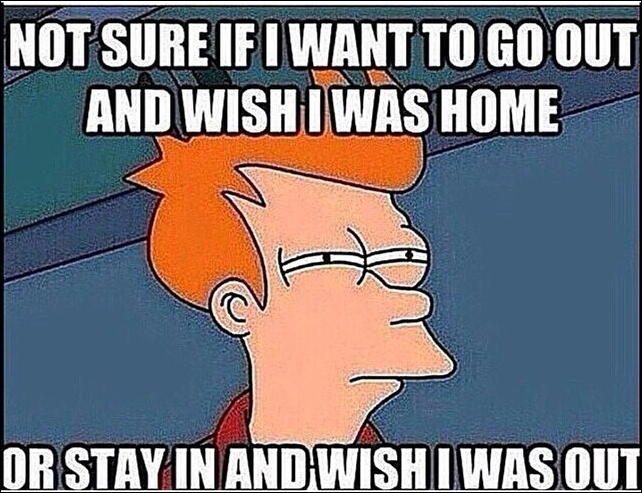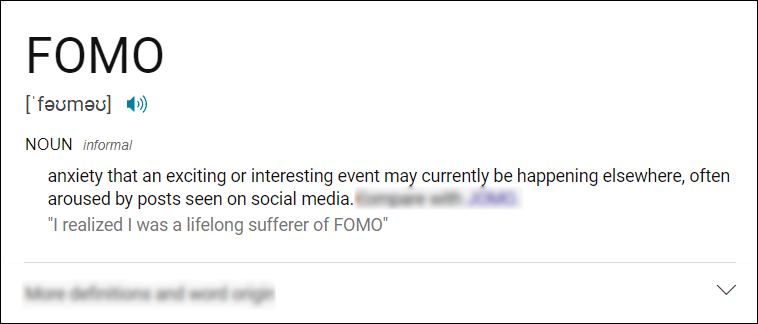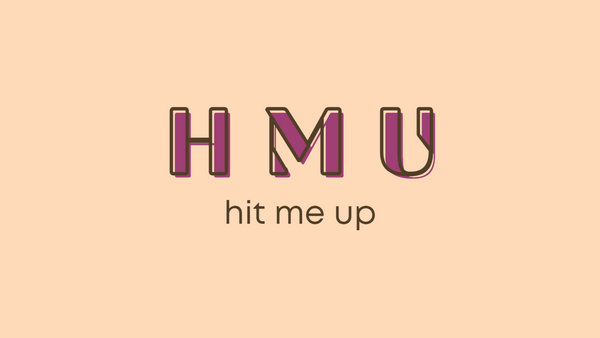Ever since the pandemic struck, there has been a drastic change in everything. From our lifestyles to work and especially on the internet. Such a dynamic space is bound to evolve with the current happenings and it has! If you’re an active internet user and consumer, you may have seen an acronym constantly appear and re-appear on the internet.
The famous FOMO! Well, it’s a terrible feeling despite the acronym’s hype and popularity. When everyone was quarantining during the pandemic’s infancy, the ‘Fear Of Missing Out’ got even louder.
But, that’s not the only time in history we’ve felt the unnerving FOMO. Believe it or not, all of us, at some point have had this dreadful feeling — just under different circumstances and for different reasons.
What Does FOMO Mean?
The ‘Fear Of Missing Out’ is the feeling of losing out on something that someone or everyone else is experiencing. It’s the sinking feeling of being ‘left out’. When the family’s heading for a fun evening but they’re forced to leave a sick you behind, you feel the FOMO. It implodes all the more when the subject of the matter means more to you.
We’ve been feeling the FOMO for longer than the concept becoming official. Financial, physical, emotional, psychological, time, space, and many other forms of restraint can keep you from fully indulging in something that is out of your reach. This can, however, sometimes simply boil down to interest, or rather the lack of it.
If you’re someone who always stays in the bracket of the “happening” crowd, popular trends, and relentlessly updates with pop culture, then, you’re likely to welcome all the more FOMO for yourself. On the contrary, if the pace of reality, especially, that of social media does not bother you, then, FOMO may not even be in your lifestyle dictionary.
Is FOMO a Bad Thing?

For most of it, FOMO can be a detrimental reaction to change. To feel FOMO, you must constantly be consuming and internalizing popular culture. This can be an exhausting affair. Firstly, pop culture, as a whole, does not resonate with everyone. It’s a relative aspect. You’re only attracted to things that interest you or are relatable in any manner.
However, in the face of constant media consumption, we tend to obsessively align with popular culture and stay at the peak of everything new and happening. All to fit in. This way, we may end up forcing ourselves to like or even love something that doesn’t truly resonate with and interest us. That being said, FOMO is not always a bad thing.
It can be motivating when it’s towards something personally crucial. For instance, if you’re a passionate (but inexperienced) actor, you may want to keep up with TikTok to both up your acting skills and grow your audience. Before you know it, you may become a star, and based on how good you are, your acting streak on TikTok can make for a portfolio.
When Did FOMO Become a Thing?
Although FOMO has been dwelling amongst us for so long, this complex emotion was first conceptualized on paper by Dan Herman. It all goes back to 2000 when Herman captured the fear of being culturally isolated, for research reasons. However, it wasn’t then that FOMO became a virus.
This strange and complicated fear began solidifying in 2004 when Patrick James McGinnis composed an opinion edition on the Fear Of Better Option! McGinnis was in fact unaware of FOMO as his practical theory was all about the FOBO. But, he did set a reliable branch of understanding into the FOMO. The fear of having better options is invariably the same fear of missing out on those options.
FOMO became a viral “psychological” phenomenon on the internet when Zuckerberg launched Facebook months after McGinnis built the foundation of FOMO. With a social network at hand, it became easier to view and compare lifestyles. Conclusively, FOMO has its roots at the beginning of mass social media consumption. Not to mention, the genesis of an era of social media addiction and well, social media anxiety as well.
How to Use FOMO?

Given its association with the not-so-pretty sides of social media and life, in general, FOMO may not always be acknowledged in a positive light. FOMO often depicts over-dependence on popular culture and mirroring it as much as possible. It also suggests a tendency to keep up and close with toxic positivity on social media.
Though FOMO stands for the ‘Fear Of Missing Out’, it’s not always used in a grammatically correct context. That is, FOMO, on the internet today is more of a condition than an acronym. However, you can use the term any way you like – as an acronym that fits the sentence when expanded or as an emotion. For instance:
- I did all I could and still got the FOMO.
- Look at us, FOMO infected people.
- I’m struggling with the FOMO on the college vacation!!
Subjective good and bad usage of FOMO
There are two ways you can use the acronym – positively and negatively. A positive use case for the infamous FOMO would be to call it out in any form; online or offline — while being fully aware that you’re psychologically above the context. For example:
- Yo, check out my dad trying to give me FOMO. Lolz
- Wow. They really think we’d FOMO over that overpriced outfit!!
As long as it doesn’t hurt anyone, a FOMO meme is acceptable to use. But, if you think a meme could harm, refrain. FOMO essentially speaks for social inferiority — and given that this is a real problem causing mental and physical health issues, it’s important to always be cautious while using this acronym out in the open.
A negative way of using FOMO is applying it in self-deprecating and guilt-driving contexts. Any context that puts you or the people around in a socially questionable place is a terrible use-case for this acronym. Here are some examples:
- Man, I can’t make it. I can feel the FOMO gushing as I text.
- Celebs never fail to give us major FOMO.
- Ditching the plan again? Tell your FOMO I said Hi.
- Aw, man. Hope you’re okay with the FOMO and stuff.
Analysis

FOMO may be an internet slang, but the underlying inferiority stemming from the fear of missing out on things that may or may not be for us is damaging. It’s one thing to feel like you’re missing out on a party you willfully disagreed to attend and it’s completely different to feel the same but when you’re under a mental/physical condition.
We’re people. As individuals, we’re entitled to live different yet fulfilling lives without measuring ourselves against the difference around us. FOMO can really chew up the contentment we can enjoy without social comparison and spit a ton of social inferiority.
Unlike other popular acronyms/internet slangs, FOMO represents and magnifies into a negative way of living. It explicitly talks about all the things we can’t have/do/be — which is not only toxic, but is also sadly becoming normalized. With social media, it’s becoming normal to force oneself to fit in, while there are campaigns to stand out.
Conclusion
FOMO is a very sensitive internet slang since it feeds off a very real socio-emotional problem. We constantly want to match up to everyone’s status of life but in hindsight, we’re lagging behind in leading a content life that’s unique to ourselves.
Considering the amount of damage this romanticized idealogy of living in constant comparison could bring, it is crucial to use FOMO consciously and with empathy and kindness at heart. Overall, this internet slang must be mindfully used online and offline.










Member discussion